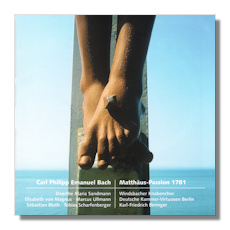
The Internet's Premier Classical Music Source
Related Links
- C.P.E. Bach Reviews
- Latest Reviews
- More Reviews
-
By Composer
-
Collections
DVD & Blu-ray
Books
Concert Reviews
Articles/Interviews
Software
Audio
Search Amazon
Recommended Links
Site News
 CD Review
CD Review
Carl Philipp Emanuel Bach

Matthäus-Passion, 1781
Doerte Maria Sandmann, soprano
Elisabeth von Magnus, mezzo-soprano
Marcus Ullmann, tenor
Sebastian Bluth, bass-baritone
Windsbacher Knabenchor
Deutsche Kammer-Virtuosen Berlin/Karl-Friedrich Beringer
Rondeau Productions ROP2034
The score of the St. Matthew Passion (1781) by Johann Sebastian and Maria Bach's fifth child and second (surviving) son, Carl Philipp Emanuel (whose tricentennial we celebrate this year), was long thought lost from the Berlin Singakademie's archive. In fact it was removed by Soviet troops during the Second World War – almost certainly for safekeeping. And rediscovered in 1999 in the Ukrainian State Library in Kiev. Dr Ulrich Leisinger of the Bach-Archiv, Leipzig, had completed reconstruction of the work by 2003.
After only a few years since the score resurfaced, Ton Koopman released a set on two CDs with soloists and his Amsterdam Baroque Choir, and Orchestra (Preiser Records 316). They were actually recorded in 2002 – to be followed shortly after (with recording dates of July 26, 27 2003, in the Kirche St. Gumbertus, Ansbach, as part of the Bachwoche) by this one with four excellent soloists and the outstanding Windsbacher Knabenchor and Deutsche Kammer-Virtuosen Berlin under conductor Karl-Friedrich Beringer.
It's a splendid performance and recording. Vibrant and colorful, Beringer gently and effortlessly emphasizes the suffering of individuals, their motives and outcomes rather than the iconography and wider doctrinal context of the Easter story – as is the case with J.S. Bach's own "Matthew Passion". That's not to say that Emanuel's is an opera (he wrote none). Nor that the drama is allowed to run away with itself (or with us) by these performers. Rather, that the Passion can only really have meaning if there are lives at stake. At the same time dignity and a sense of service explain why the loss of life is as serious as it is.
Significant, too, is C.P.E. Bach's superb lyricism. This may surprise listeners used only to the composer's work in the galant style. For some, it will mean a greater sense of forward movement and excitement – even in such a somber theme. Add to this Bach's requirement to scale back his work for performance in smaller churches and with less of a "following" than his father had at Leipzig; and add the use of multiple sources including many recognizably quoted from his father; and some highly imaginative instrumentation. Although at the end of the German Passion's conventional life, the work is a progressive, winning, beautiful one in many senses of those words. And highly enjoyable.
As one expects, the articulation of these singers is first class: every word is audible. Every nuance clean and clear: listen to the restraint yet depth of the chorus, "Herr, stärke mich" [tr.20]; and the enthusiasm of the following recitative… just as in CPE's father's setting, by the way. Variations in pace, dynamic and attack here are typical of those which make this such enthralling listening throughout. Nor is the delicacy of Bach's writing blurred: the simplicity of the chorus, "Nun was Du" [tr.24] is matched by the steady conviction of the aria, "Versammlet euch" [tr.26], for instance. This makes perfect dramatic sense. Yet in Beringer's hands it is a controlled and directed drama – to the religious import of the text, not musical spectacle. The result, of course, is that the music shines. This is a much shorter work than Sebastian's, of course. But it is likely to present a new face of C.P.E. Bach; and one to win him new admirers.
The acoustic is excellent. It affords just the right amount of atmosphere evoking the occasion that the North German Passions in the tradition of CPE's father represented; but without spurious effect. The booklet is informative, consisting largely of pertinent answers by Leisinger in an interview about the Passion itself, its place in Emanuel's output and about the composer's place in music as the Carl Philipp Emanuel Bach Edition nears completion. There is also, of course, the complete text in German, and useful sketches of the soloists, Beringer and work of the ensembles. Lovers of the repertoire shouldn't hesitate. Nor those wishing to be stimulated into wonder and pleasure by C.P.E. Bach's achievement. And of course not those already familiar with the work of Johann Sebastian's most famous son (at least during his lifetime). There may be more spectacular recordings of Emanuel's choral works to come throughout 2014. But there are unlikely to be many with as much compassion, as much sense of purpose and attention to the text and music; and as much sense of warm humanity and hence pathos in loss. Quite an achievement; and one to be fully recommended.
Copyright © 2014, Mark Sealey




















